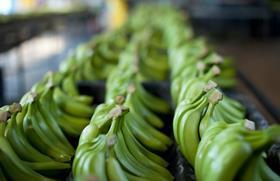
Retailers in the Netherlands have agreed a ‘living wage’ for their banana suppliers in a model that could be adopted by other western European nations.
The Sustainable Trade Initiative (IDH) is a Dutch-run project, set up in 2008 and funded by the governments of the Netherlands, Sweden, Denmark and Norway, aiming to help companies across a dozen sectors achieve sustainable sourcing. Its goal is to make imports of fruit and vegetables from Africa, Asia and South America 100 per cent sustainable by 2020.
Outlining the initiative’s progress at the International Banana Congress in Miami, IDH’s Kebba Colley revealed that the Dutch government has recently signed a covenant on living wages in the banana sector, in which it will get all Dutch retailers to set a target to pay their suppliers a return that allows them to give their farmers a so-called living wage. All of the Dutch supermarkets have now agreed, according to Colley, who added that there has been interest in the UK and Germany, representatives of whose governments have approached the Dutch to hear more about how they have implemented the approach.
Bananas were selected as the target of the initiative as the EU is the largest importer of the fruit, and the sector is dominated by large-scale producers. A number of major banana companies, including Chiquita, Fyffes, Del Monte and Dole, have already signed up to support the Sustainable Trade Initiative Fruit & Vegetables (SIFAV) goals, and two further projects have been carried out: one with the World Banana Forum in Ecuador and Ghana, and another with Fyffes and IPL in Costa Rica and Belize.
Describing the Fyffes/IPL study, Colley said the goals were to conduct living wage benchmark studies in Belize and Costa Rica; develop practical tools for farm managers to calculate the status of current wages compared to the living wage and to monitor progress over time; consider strategies and workplans towards the payment of living wages on selected pilot farms; and facilitate and stimulate a dialogue on wages and shared value in the banana sector and beyond.
Colley admitted that IDH is not likely to achieve the 100 per cent target by next year as suppliers periodically change the farms they work with; instead it is an ongoing process to help them achieve sustainability.
Beyond 2020, the next phase of the SIFAV project will focus on three key streams: environmental (food waste, water stress, soil degradation etc), social themes (living wage, smallholder inclusion, working conditions, gender equality) and innovative finance (business support, de-risking, equity). A €100 million fund has also been established to support emerging companies in Africa to become commercialised and assist them to trade internationally.



